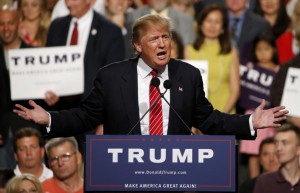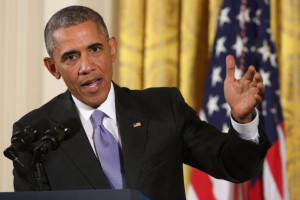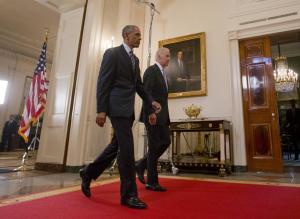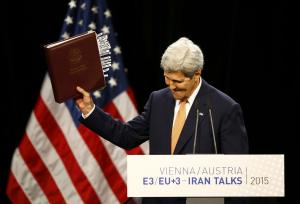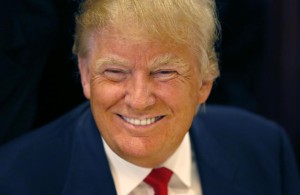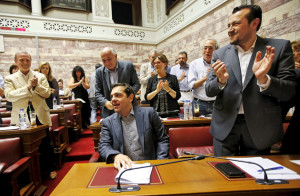July 10 (Reuters) – Following is the latest news on Greece’s debt crisis as euro zone leaders fight to the finish to keep near-bankrupt Greece in the euro zone. All times are in GMT.
Sunday
1438 – Lithuanian president says Greece staying in euro zone or leaving will be “very, very costly for everybody”.
1417 – Merkel says most important currency has vanished with Greece, which is trust; deal not wanted at any price; principles must be upheld.
1145 – Russia intends to support an economic recovery in Greece by expanding cooperation in the energy sector, Russian Energy Minister Alexander Novak says.
1047 – Luxembourg’s foreign minister makes an impassioned plea for Germany to avoid a Greek exit from the euro, warning Berlin of a catastrophic schism with France if it pushes for Athens to leave the currency union.
0904 – EU’s Moscovici says institutions agree there is a basis for negotiations, Greece must do more
0854 – Slovak finance minister says Greece must front-load reforms to get deal, no agreement possible on Sunday
0835 – Italy’s Padoan says wants to see Greek parliament take measures from Monday, biggest obstacle is lack of trust
0752 – EU’s Tusk says Sunday’s planned EU summit is cancelled. Separate euro zone meeting to start at 1400 GMT
Saturday
2217 – Euro zone finance ministers’ talks on a bailout for Greece remain “very difficult” and will resume at 0900 GMT on Sunday after breaking overnight, Eurogroup President Jeroen Dijsselbloem tells reporters.
2210 – Euro zone finance ministers are pressing Greece to commit to more budget and reform measures before they will consider opening negotiations on a bailout, sources close to the talks say.
2116 – The German government says Greece could take a five-year “time-out” from the euro zone and have some debts written off if Athens fails to improve its proposals for a bailout.
1833 – Euro zone finance ministers demand Greece go beyond painful austerity measures accepted by Prime Minister Alexis Tsipras if he wants them to open negotiations on a third bailout for his bankrupt country to keep it in the euro, sources say.
1811 – Capital controls imposed on Greece’s banks will remain in place for at least another two months, Economy Minister George Stathakis says.
1629 – Frankfurter Allgemeine Sonntagszeitung cites a position paper from the German Finance Ministry that suggests two alternative courses for Greece, including a “timeout” from the euro zone.
1557 – The parties in Angela Merkel’s coalition government send conflicting signals on Greece’s reform proposals, with some leading Social Democrats welcoming concessions while senior conservatives voice scepticism.
1412 – Euro zone finance ministers arrive in Brussels. Germany’s Wolfgang Schaeuble says he expects “exceptionally difficult negotiations”. Eurogroup Chairman and Dutch Finance Minister Jeroen Dijsselbloem says: “We are still far away.”
1111 – A bailout package for Greece needs to include a reduction in the country’s debt burden, French Economy Minister Emmanuel Macron told German daily Die Welt in an interview published on Saturday.
1001 – Euro zone finance ministers meeting in Brussels on Saturday have serious doubts about Greece’s request for a bailout and a deal to start negotiating on the basis of Athens’ proposals is far from certain, sources close to the talks say.
0707 – The European Commission, European Central Bank and International Monetary Fund have told euro zone governments that proposals from Greece for a bailout loan are a basis for negotiation, an EU official says.
0208 – Greek Prime Minister Alexis Tsipras claimed a strong mandate to complete negotiations with international creditors after winning the backing of parliament over a painful new package of reform measures.
0044 – The Greek parliament voted overwhelmingly on Saturday in favour of authorizing the left-wing government of Prime Minister Alexis Tsipras to negotiate with international creditors on the basis of a reform programme unveiled this week.
Friday
2231 – The European Commission, European Central Bank and the International Monetary Fund have given a positive assessment of the Greek government’s request to start negotiations on a new bailout, a person close to the matter said.
2224 – Greece’s third largest political force, the far-right Golden Dawn party, said it will not back government proposals submitted to the country’s creditors in a race to reach a cash-for-reforms deal and avert bankruptcy.
2206 – The leader of Greece’s main opposition party, New Democracy, said it would back attempts by the government to seal a deal with international creditors to stave off financial meltdown.
2154 – Prime Minister Alexis Tsipras defended the painful bailout proposals his leftwing government presented to parliament, saying they were difficult measures but would help keep Greece in the euro zone.
2126 – Greece’s finance minister pledged to strive for maximum gains for Greeks in aid talks with lenders, saying a referendum in which voters rejected creditors’ demands had strengthened their standing in negotiations.
1746 – The White House said it welcomed the latest proposal by Greece to resolve its debt crisis and that it was something for Athens’ creditors to weigh.
1556 – A Metron Analysis poll shows 84 percent of Greeks favour keeping the euro, 12 percent would prefer a return to the drachma, and 45.6 percent would vote for PM Tsipras’s Syriza party if there were parliamentary elections.
1537 – Greece will succeed in transferring bonds currently held by the ECB to the European Stability Mechanism, a long-standing demand by Athens, Finance Minister Euclid Tsakalotos tells parliament.
This would allow Athens to avoid paying the central bank almost 7 billion euros from maturing bonds due over the next few weeks. However, it remained unclear how such a transfer would be possible.
1514 – Greece’s banks will need 10-14 billion euros of fresh capital to keep them afloat and more time before they reopen, even if a deal is reached with European creditors on Sunday, a senior Greek banker tells Reuters.
1359 – Lithuanian President Dalia Grybauskaite says Greek reform proposals submitted to the euro zone appear insufficient: “It is probably too early to evaluate them because they are based on old information and it seems those proposals will really not be enough.”
1319 – Greece’s main opposition conservatives say they will back the leftist government of Alexis Tsipras to secure a cash-for reforms deal with the country’s international creditors that will keep the country within the euro zone.
1315 – Fitch rating agency says an eventual exit from the euro zone is now the probable outcome for Greece.
1310 – Russian President Vladimir Putin says Greece has not asked Moscow for aid to overcome its debt problems but says he hopes the crisis can be resolved soon.
1305 – The European Central Bank’s governing council will likely hold a telephone conference on Monday to discuss emergency liquidity assistance to Greek banks, a person familiar with the matter says.
1242 – U.S. Treasury Secretary Jack Lew says Greece and its creditors appear to be closer to a deal, adding it is critical that the debt-stricken country make difficult structural reforms and adjustments to its cash flow.
1236 – Greek Prime Minister Alexis Tsipras appeals to his leftist Syriza party’s lawmakers to back a tough reforms package after abruptly offering last-minute concessions to try to save the country from financial meltdown.
1223 – Greece’s latest reform proposals are no basis for further negotiations on a third bailout programme, a senior German conservative lawmaker tells Reuters, adding that Greece would do better to aim for a new start with its own currency.
1214 – Five hardliners in Greece’s ruling Syriza party say dropping out of the euro zone and returning to the drachma is preferable to a deal with international creditors laced with austerity and without any provision for debt relief.
1144 – Greek centrist party To Potami says it will back fiscal reforms submitted in parliament by the leftist government to secure desperately needed aid from international lenders to stave off bankruptcy.
1136 – Greece has made some progress in its proposal to creditors but it is not clear whether that will suffice, says Slovak Finance Minister Peter Kazimir.
1057 – The chances Greece will leave the euro zone this year have fallen, according to bookmakers’ odds, with one firm saying the likelihood is now lower than at any time this year.
1045 – Italian, Spanish and Portuguese bond yields fall 10-15 basis points after Greece sends a package of reform proposals to its euro zone creditors in a last-ditch attempt to get new funds and avoid bankruptcy.
1035 – Significant progress is being made towards an aid-for-reforms deal between Greece and its creditors, Italian Economy Minister Pier Carlo Padoan says.
1013 – The International Monetary Fund, the European Commission and the European Central Bank are analysing proposals submitted by Greece on economic reforms and will deliver their views by the end of Friday, a European Commission spokesman says.
0947 – Greece’s latest reform proposals show the Athens government is serious about making efforts to shape up its economy, a senior lawmaker in Germany’s Social Democrats (SPD) tells Reuters.
0937 – A German government spokesman declines to comment on the content of Greece’s latest reform proposals, and a finance ministry spokesman says Berlin will not accept any form of debt reduction for Greece that would lower its real value.
0936 – Euro zone finance ministers meeting on Saturday will discuss Greece’s debt burden and whether it needs some relief as part of broader talks on whether to grant Athens’ request to negotiate a bailout loan, a senior EU official says.
0929 – A senior EU official says he would be amazed if European Union leaders overturned any clear decision taken by a meeting of euro zone finance ministers on Saturday. The EU leaders are due to meet on Sunday.
0916 – Euro zone finance ministers will only discuss bridging finance for Greece to tide it over until a bailout loan is ready after they have agreed to negotiate such a medium-term loan, a senior EU official says.
0905 – Greece’s latest reform proposals are a good basis for negotiation and mark an important step forward, Axel Schaefer, a senior lawmaker in Germany’s Social Democrats (SPD), says.
0900 – Italian Prime Minister Matteo Renzi says he is optimistic an aid-for-reforms deal will be reached between Greece and its creditors and he hopes a quick accord will mean a meeting of EU leaders planned for Sunday will no longer be needed.
0900 – Greek industrial output tumbled 4 percent from the same period a year earlier after a three-month rise, statistics service ELSTAT says, as political upheaval and deadlocked talks with creditors hit economic activity.
0852 – Eurogroup chief Jeroen Djisselbloem says a “major decision” on Greece could be made at the planned meeting of euro zone finance ministers on Saturday.
0817 – French President Francois Hollande says negotiations between Greece and its international creditors must resume with the aim of reaching a deal after the country came up with “serious and credible” proposals.
0801 – French Economy Minister Emmanuel Macron says he is reasonably optimistic that Greece will reach an aid-for-reforms deal with its creditors.
0739 – Maltese Prime Minister Joseph Muscat says new Greek proposals setting out economic reforms Athens will undertake in the next three years appear to provide a basis for discussing a new bailout loan.
0717 – A senior member of German Chancellor Angela Merkel’s party says he has trouble trusting Greece’s latest proposals to its euro zone creditors as the country last week decisively rejected the austerity measures in a referendum.
0647 – Greek Prime Minister Alexis Tsipras has appealed to his Syriza lawmakers to back a fiscal plan in return for aid from creditors, a government official says.
0626 – Latvian Prime Minister Laimdota Straujuma tells German radio she would not agree to a proposal for Greece that included a debt writedown.
0534 – Greek Interior Minister Nikos Voutsis says he is optimistic the country can clinch a “good agreement” on terms of a bailout package submitted to creditors on Thursday night.
0505 – The Greek parliament will give the government a mandate to negotiate with creditors for a cash-for-reforms deal, the parliamentary spokesman of the ruling Syriza party says.



